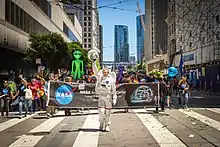LGBT people in science
LGBT people in science are students, professionals, hobbyists, and anyone else who is LGBT and interested in science.

Difficulties for LGBT people in science
There are traditions and expectations that LGBT people should not study or have careers in science, according to Manil Suri.[1] In 2016 the American Physical Society published a list of ways in which LGBT physicists have a more difficult career experience than their non-LGBT counterparts.[2]
Studies have shown that many LGBT faculty and researchers are not out in their departments, and coming out may negatively affect retention.[3] This is of particular issue in the STEM field as the work cultures and professional environments within this field of work can often exclude or alienate the existence of the LGBT community and the individuals within it.[4][5][6][7]
Chemist David Smith speculated that the visibility of more LGBT role models in science would make it easier for other LGBT students to join the sciences, and conducted a survey which seemed to support this view.[8]
Mathematician, computer scientist, logician, cryptanalyst, philosopher, and theoretical biologist Alan Turing, was a prominent queer English scholar during the twentieth century that led a group of cryptanalysts in cracking the code of the Enigma Machine, ultimately helped turning the tide of World War II. Despite his service to the Allied cause, he was prosecuted in 1952 for homosexual acts and had most of his academic work covered up through the Official Secrets Act.[9]
A report on a 2015 survey of United States undergraduate students found that gay students of science were more likely to change their major to a subject outside of science than non-LGBT students.[10] Some academic commentators who study LGBT issues commented that LGBT students face social barriers to studying science which non-LGBT people do not experience.[11] Various activist organizations used this study as supporting evidence that social changes could bring equal opportunity for LGBT people to study and have careers in science.[12]
Organizations
In recognition that LGBT people are underrepresented in the sciences, various universities have programs to encourage more LGBT students to join their science programs.[13] The organization is oSTEM (Out in Science, Technology, Engineering, and Mathematics) has a network of about 90 student chapters at universities across the United States.[14] oSTEM has an annual conference and aims to provide a place for LGBT science students to gather, whether they are out or not.[15] Other professional organizations for LGBT people in science include the National Organization of Gay and Lesbian Scientists and Technical Professionals (NOGLSTP)[16] and Pride in STEM.[17] NOGLSTP educates professional communities about LGBT issues and offers two scholarships annually.[16] Pride in STEM, a charitable organization based in the United Kingdom, co-founded the International Day of LGBTQ+ People in Science, Technology, Engineering and Maths.[17] In Germany, a similar movement was founded under the name LGBTQ STEM Berlin.[18]
The first interdisciplinary conference in the UK for LGBTQ+ people working in STEM fields was the LGBTSTEMinar hosted at the University of Sheffield in 2016.[19][20] It has been hosted annually since then and in 2020 the Royal Society Athena Prize was awarded for this work.[21]
See also
- Category:LGBT scientists[3]
- 500 Queer Scientists
References
- Suri, Manil (4 September 2015). "Why Is Science So Straight?". The New York Times.
- American Physical Society (March 2016). LGBT Climate in Physics (PDF). American Physical Society. ISBN 978-0-9848110-7-6.
- Patridge, E.; Barthelemy, R. (2014). "Factors Impacting The Academic Climate for LGBTQ STEM faculty". Journal of Women and Minorities in Science and Engineering. 20 (1): 75–98. doi:10.1615/JWomenMinorScienEng.2014007429.
- Barres, Ben, Beth Montague-Hellen, and Jeremy Yoder. “Coming Out: The Experience of LGBT+ People in STEM.” Genome biology 18.1 (2017): 62. Web.
- Barres, B., E. H. Montague - Hellen, and J. Yoder. “Coming Out: The Experience of LGBT+ People in STEM.” (2017): n. pag. Web.
- Cech, Erin. “LGBT Professionals’ Workplace Experiences in STEM-Related Federal Agencies.” Association for Engineering Education - Engineering Library Division Papers. Atlanta: American Society for Engineering Education-ASEE, 2015. 26.1094.1–26.1094.10. Web.
- Broadfoot, Marla. “Most Gay Scientists Are Out in the Lab: Female-Dominated Fields Found to Be More welcoming.(SOCIETY).” Nature 524.7565 (2015): 275. Print.
- Smith, David (1 April 2014). "'No sexuality please, we're scientists'". Chemistry World.
- Doan, Laura L. “Queer History/queer Memory: The Case of Alan Turing.” GLQ: a journal of lesbian and gay studies 23.1 (2017): 113–136. Web.
- Hughes, Bryce E. (14 March 2018). "Coming out in STEM: Factors affecting retention of sexual minority STEM students". Science Advances. 4 (3): eaao6373. doi:10.1126/sciadv.aao6373. PMC 5851677. PMID 29546240.
- Langin, Katie (14 March 2018). "STEM is losing male LGBQ undergrads". Science.
- Ruiz, Rebecca (14 March 2018). "The culture of STEM may sideline aspiring queer scientists". Mashable.
- Grijseels, Dorieke (14 February 2018). "Out and About STEM: Why visibility of LGBT scientists is important". The Biochemist Blog.
- "About oSTEM | Out in Science, Technology, Engineering, and Mathematics". www.ostem.org. Retrieved 10 October 2019.
- Pain, Elizabeth (20 November 2017). "Coming out and standing up for others". Science. Retrieved 10 October 2019.
- "Queered Science: NOGLSTP's Rochelle Diamond Forged A Path For All of Us". Autostraddle. 1 November 2013. Retrieved 10 October 2019.
- "Nature is proud to support Pride in STEM". Nature. 571 (7763): 5. 2 July 2019. doi:10.1038/d41586-019-02022-8. PMID 31267063.
- https://twitter.com/lgbtqstemberlin?lang=en
- Montague-Hellen, Beth (11 February 2016). "First conference in the UK for LGBT STEM professionals". The Biochemical Society Blog. Retrieved 26 November 2020.
- "Empowering LGBT+ STEMinar celebrates diversity in science". The Royal Society of Chemistry. Retrieved 26 November 2020.
- "Royal Society Athena Prize". The Royal Society. Retrieved 26 November 2020.
- https://www.nasa.gov/lgbt
Further reading
- Welton, Tom (14 February 2014). "Gay prejudice? It's not easy admitting you're … a scientist". the Guardian.
- Barres, Ben; Montague-Hellen, Beth; Yoder, Jeremy (4 April 2017). "Coming out: the experience of LGBT+ people in STEM". Genome Biology. 18 (1): 62. doi:10.1186/s13059-017-1198-y. PMC 5379691. PMID 28372568.
- Scarpelli, Andrew (19 October 2017). "How I realized that LGBT+ scientists like me can inspire others in their field". Massive.